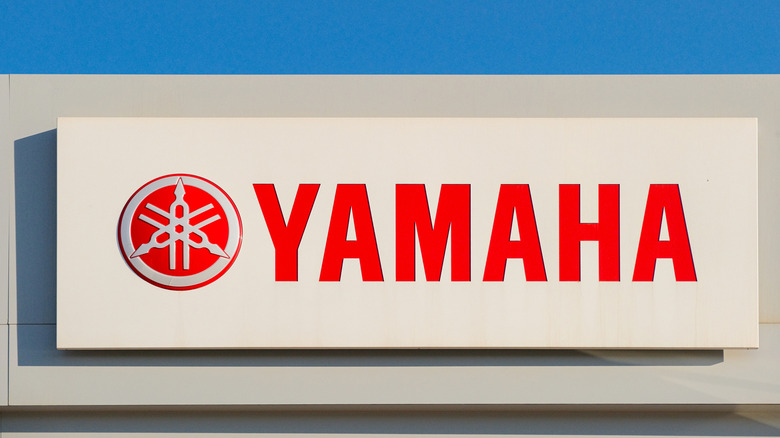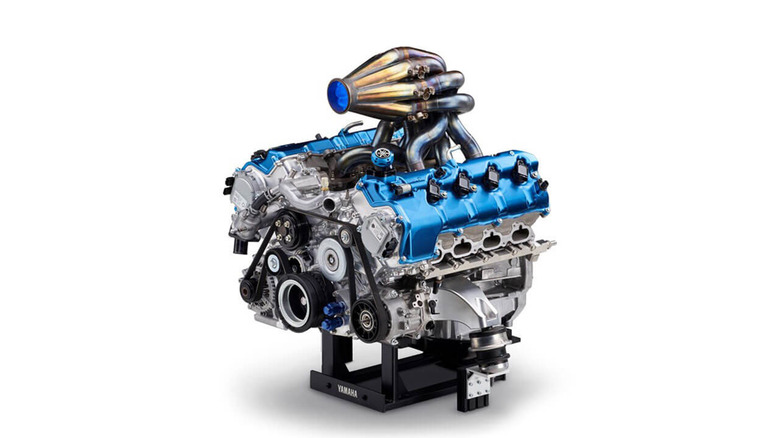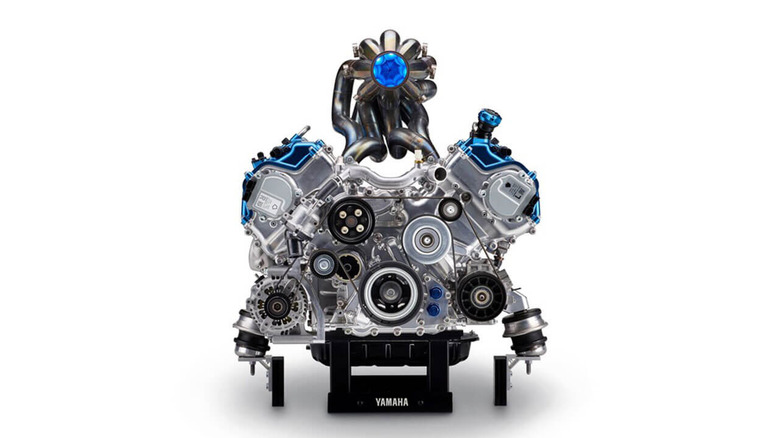How Much HP Can Yamaha's Hydrogen-Powered V8 Engine Actually Produce?
In 2022, Yamaha reimagined what a high-performance engine can be, and sound like, in a emissions-conscious future. In partnership with Toyota, the company took a 5.0-liter V8 from the Lexus RC F and transformed it into something entirely new: A hydrogen-powered beast that doesn't rely on batteries or fuel cells. This engine still roars like a V8 should, but it runs on compressed hydrogen instead of gasoline.
The big question, however, is how many ponies does it pack? According to Yamaha, this hydrogen-powered V8 produces 450 horsepower at 6,800 rpm and 398 lb-ft of torque at 3,600 rpm. Impressive figures given that they're not far off of the gas-powered unit it's based on.
Toyota's goal with this project is not to replace the EV, but rather to offer a cleaner future for petrolheads who desire a mechanical connection to their machine. Since there are very few hydrogen-powered cars currently available on the market, this would be an epic addition.
It's more than a lab experiment. This project is part of a wider effort by Toyota, Yamaha, and other major Japanese manufacturers to keep internal combustion alive, but to make it cleaner, greener, and maybe more exciting than before.
Yamaha had to rebuild the V8 completely
Making an engine run on hydrogen isn't as simple as swapping the fuel. Due to the way hydrogen-powered engines work, hydrogen burns hotter and ignites faster than gasoline, so Yamaha had to rethink almost everything under the hood. The intake manifold, fuel injectors, cylinder heads, even the way air moves through the engine, were redesigned to prevent misfires and manage extreme combustion temperatures.
Nearly every component had to be custom-built to handle hydrogen, but in spite of all the tweaks, they made sure the engine still feels like a proper V8. It revs high, sounds aggressive, and delivers power in a way that should satisfy die-hard performance fans. That sound, by the way, is no accident. Yamaha is known for tuning everything from motorcycles to musical instruments, and the exhaust note of this engine was engineered to stir emotion.
Toyota, Yamaha, Kawasaki, and Subaru are all exploring hydrogen combustion together. It's not just about cars, it could potentially show up in motorcycles, trucks, or even industrial machinery. While it's early days, this joint venture could give hydrogen a real shot at becoming more than a niche experiment.
Could hydrogen V8s actually hit the streets?
As exciting as Yamaha's hydrogen V8 sounds, literally and figuratively, it's still very much a prototype. There's no production model in sight, and real-world hurdles have hindered hydrogen-powered engines from taking off. Hydrogen fueling stations are scarce, especially outside of Japan and California. Even if you can find the fuel, producing it cleanly using renewable energy is expensive and inefficient, at least for now.
Still, there's something enticing about a blend of gas and electric. EVs are quiet, smooth, and insanely fast, but they generally can't compete with the engagement and analog thrill of mechanical performance cars. Yamaha's engine shows that combustion doesn't have to disappear, it just has to evolve. Imagine a future where you can drive an old-school growling V8 but without worrying about your carbon footprint.
Sure, that kind of experience might not be everyone's cup of tea, but for those who want performance and to be part of progress, hydrogen combustion could be that very sweet spot.


